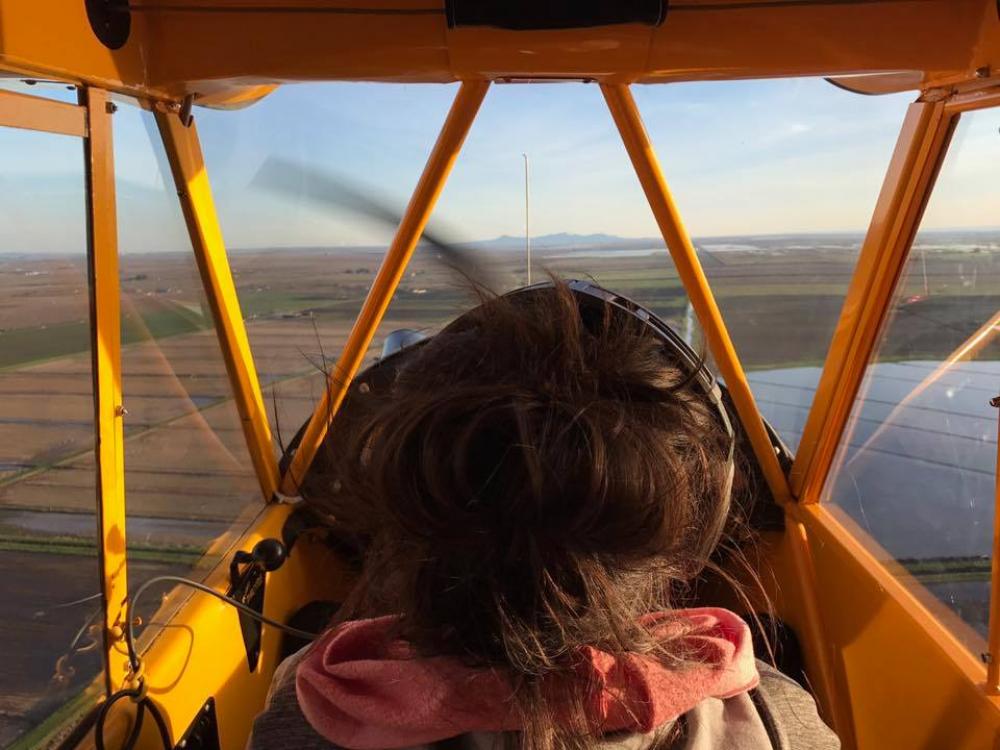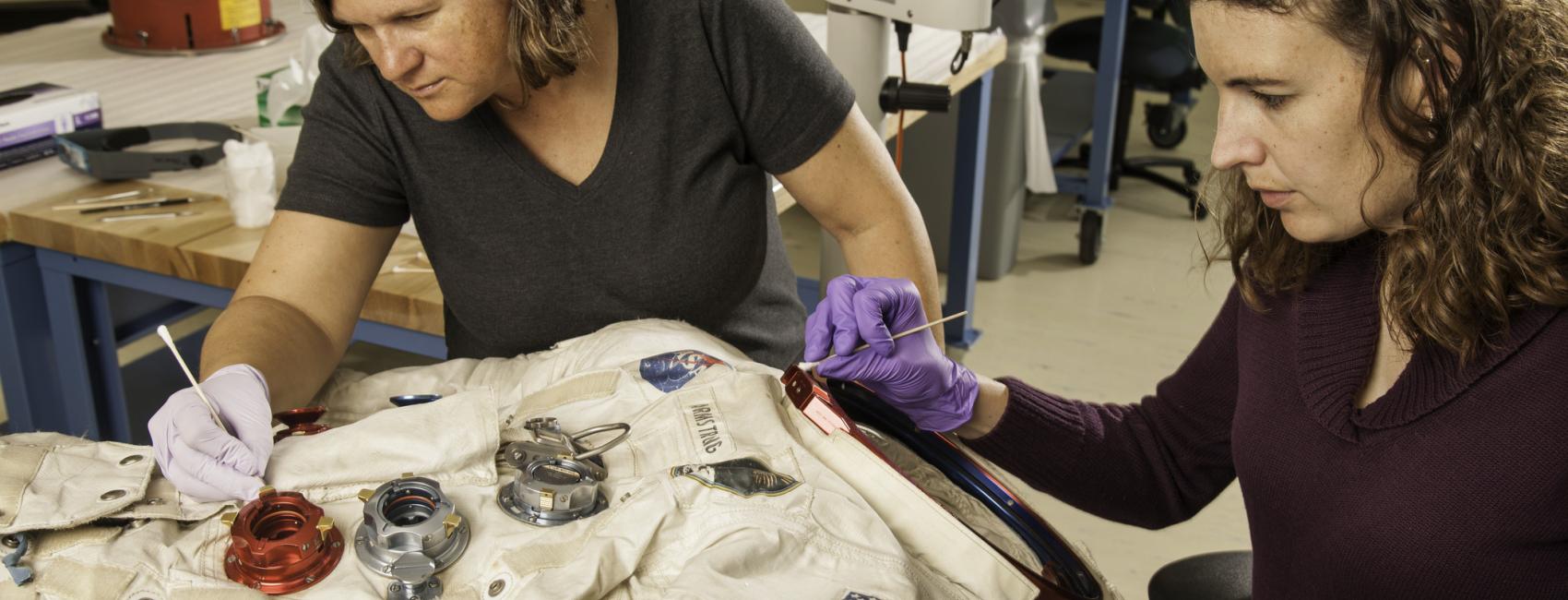
Sep 19, 2017
By Morgan Bulman, Digital Experiences Intern
Ariel Tweto is a self-proclaimed adrenaline junkie, but getting her blood pumping isn’t the only reason she flies.
This summer, Tweto flew for a purpose — to raise awareness about aviation — as she participated in her first air race, the Air Race Classic. An all-women cross-country annual competition hosted by the Ninety-Nines Club (a nonprofit for licensed female pilots), the Air Race Classic brings women of all ages together for three days. And, like Tweto, they come back every year because they all have one thing in common: a love of flying.
But it’s a passion that’s difficult for most women to share. According to Lin Caywood, membership chairman of the Ninety-Nines Sugarloaf Chapter in Maryland, less than 6 percent of licensed pilots are female. And that number depreciates by half when it comes to other careers related to aviation. Only 3 percent of air mechanics and engineers are women.
Ariel Tweto piloting an airplane, July 2017.
Often described as an “old boy’s club,” aviation largely remains a male-dominated field and it’s something that Tweto and organizations like the Ninety-Nines are working hard to change. In fact, it’s the reason the Air Race Classic was created in the first place: to showcase female pilots.
“Anything I can do to help promote aviation, I’m all for it, especially for female pilots,” said Tweto. “I am in.”
Tweto herself is an anomaly; not only is she a young woman, she’s Native American. Born in a remote village in Unakleet, Alaska, Tweto’s childhood was unusual — she practically grew up in the back of an airplane. Alaska’s lack of roads make airports crucial for travel, and her parents — Jim, former owner of Era Airlines, and Ferno— supported their three daughters’ pursuit of earning pilots' licenses. Tweto earned hers while starring in the Discovery Channel television show, Flying Wild Alaska, where her humor and enthusiasm captured the hearts of millions of viewers.
But her passion for aviation, even after the show came to an end, has not waned.
Tweto continues to fly and is interested in doing more with education, such as helping out with the Women Soar You Soar camp that teaches young girls about opportunities in aviation. Initially recruited as a mentor the year following the camp’s start in 2005, aerobatic champion and retired airline pilot Debby Rihn-Harvey has served as its chairman ever since and was the person who turned Tweto on to the program.
Like Tweto, Rihn-Harvey’s childhood can be summed up in one word: airplanes. Most women who become pilots have a family history in aviation—the field tends to have high barriers to access financially and a lack of diversity. Women Soar You Soar, however, aims to fill that gap by exposing girls between the ages of 14 and 18 to a variety of careers associated with flight, whether air traffic controllers or astronauts.
“We wanted to make the program inviting to all young ladies of all cultural backgrounds and affordable to all,” added Rihn-Harvey. “The mission of the program strives to engage, inspire, educate, and empower young women to pursue their dreams in aviation.”
It’s a sentiment echoed by the Ninety-Nines, who host similar youth events in conjunction with the Air Race Classic each year, targeting young women interested in science, technology, engineering, or math. Both programs provide attendees face time with the pilots.
“We definitely think the one-on-one interaction, where the young ladies can actually meet the female pilots and hear their stories directly, is the best way to create the catalyst for exploring aviation as a career later down the road,” explained Caywood.
And there’s a lot of overlap. Most of the women who participate in the race also serve as mentors at Women Soar You Soar as a part of the EAA AirVenture in OshKosh, Wisconsin — it attracts around 100 girls and over 20 mentors annually. The camp was started by Elissa Lines, a former EAA vice president, after noticing a lack of women interested in aviation. The program served as an introduction to aviation, and Rihn-Harvey says many of the girls credit the camp and their dynamic mentors for their self-confidence and pursuit of aviation-related careers. Tweto herself is hoping to be a role model, or at least an example of how flying can change a person’s life.
“There’s nothing like it,” Tweto said about flying. “You also feel so free and powerful, I don’t know it’s hard to describe, you just gotta do it.”
A group of Women Soar You Soar attendees, 2016.
Her plane from this year’s competition was rightfully dubbed “Team Popping Bubbles,” echoing the name of Tweto’s nonprofit organization that aims to educate and raise funds for suicide prevention for Alaskan teenagers. Having access to airplanes is one of the ways Tweto is trying to help. The risk of suicide increases 18 percent for every five degrees of northern latitude, according to the Alaska Section of Epidemology. And those living in rural communities are even more at risk.
“If we couldn’t fly, then no one would be able to leave and we couldn’t pop our bubbles,” said Tweto, explaining her organization’s namesake. “I always say when you’re driving a car you can drive a mile, but when you’re flying an airplane you could use a half a mile of a runway to explore the world. Flying has definitely opened my eyes to so many different cultures [and] ways of life.”
Tweto wants to show how flight and the ability to leave her rural home changed her entire perspective on life. Part of naming her team after the organization was to raise scholarship funds to provide kids in remote areas with the support to learn how to fly.
Rihn-Harvey also believes flight changed her life. As a young girl, Rihn-Harvey’s father flew an airplane everywhere; if they were travelling somewhere more than 50 miles away, they rented a plane instead of a car. It was this exact reason why Rihn-Harvey thought of flying as a hobby, not a profession. Yet after pursuing a career in medical research, Rihn-Harvey found herself still drawn to the sky — so much so that she eventually became one of the highest ranked aerobatics competitors in the United States.
“We want to show them they can do whatever they want.”
“I get a lot of girls who come out that were never aware of airplanes or that it was something they could do,” said Rihn-Harvey about the camp. “Several of them do come in who have parents in aviation, but then they see other women who are absolutely crazy — like Ariel Tweto — who just love what they do. We want to show them they can do whatever they want.”
Often, that first trip in a plane can be life-altering. One of the young girls who attended aviation events in the past during the Air Race Classic has now joined the Civil Air Patrol and is looking for a career in the Air Force.
The message of groups like the Ninety-Nines or Women Soar You Soar is focused on getting people up in a plane to show that flying is a possibility and that it’s a plausible career for anyone, especially young women.
And although expensive, organizations like the Ninety-Nines provide resources to help supplement young girl’s dreams through scholarships.
According to Caywood, it’s more than just learning to fly, it’s about building confidence.
“The confidence that learning to fly builds in someone — just knowing that you’re controlling this large piece of equipment barreling through the sky at fast speeds — is just so rewarding,” said Caywood. “It’s just awe-inspiring to be up in the clouds, or above them, and seeing the land below.”

We rely on the generous support of donors, sponsors, members, and other benefactors to share the history and impact of aviation and spaceflight, educate the public, and inspire future generations. With your help, we can continue to preserve and safeguard the world’s most comprehensive collection of artifacts representing the great achievements of flight and space exploration.
We rely on the generous support of donors, sponsors, members, and other benefactors to share the history and impact of aviation and spaceflight, educate the public, and inspire future generations. With your help, we can continue to preserve and safeguard the world’s most comprehensive collection of artifacts representing the great achievements of flight and space exploration.